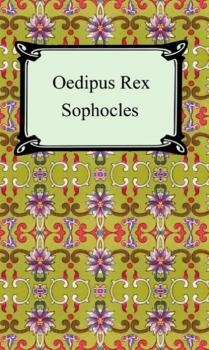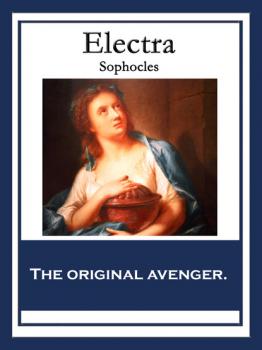Sophocles
Список книг автора SophoclesOedipus at Colonus
Perhaps the most philosophical of the three Theban plays, «Oedipus at Colonus» continues the story begun in «Oedipus the King.» Oedipus is a blind beggar, tainted by his past, and nearing the end of his life. He travels with his daughter, Antigone, until they reach the holy ground of the Furies, which coincides with the prophecy of his place of death. There he is sought after by the warring kings of Athens and Thebes, for his final resting place will grant victory and peace to the country in which his body will reside. Written in the final year of Sophocles' life, this play addresses morality and guilt, fate, and the inexplicable and heroic transformation of a man who perseveres through a difficult life.
The Complete Plays of Sophocles (The Seven Plays in English Verse)
One of the most famous poets from classical antiquity, Sophocles was one of three important ancient Greek tragedians, the others being Aeschylus and Euripides. Writing during the 5th century BC, Sophocles created some one hundred and twenty three plays during his lifetime, of which only seven have survived in their entirety. Included in this edition are those seven complete plays, as translated by Lewis Campbell and include the following: Antigone, Aias (Ajax), Oedipus the King, Electra, The Trachinian Maidens (The Trachiniae), Philoctetes, and Oedipus at Colonus. These classic tragedies are essential reading and their influence on modern literature and drama is a profound one.
Oedipus Rex (Oedipus the King)
The first drama in the Oedipus Trilogy, «Oedipus Rex», is the tragic tale of Oedipus who has accidentally killed his father and married his mother. One of the most widely read of all Greek tragedies, «Oedipus Rex», stands as one of not only the greatest dramas from classical antiquity but as one of the greatest dramas of all time. Its influence on literature and theatre cannot be overstated and it is as compelling today as when it was first performed.
The Three Theban Plays: Antigone, Oedipus the King, and Oedipus at Colonus (Translated by Francis Storr with Introductions by Richard C. Jebb)
Sophocles, along with Aeschylus and Euripides, is considered one of three important ancient Greek tragedians. Writing during the 5th century BC, Sophocles created some one hundred and twenty three plays during his lifetime, of which only seven have survived in their entirety. In this edition are included the three “Theban” plays, which are widely considered his most important works. This collection of dramas includes “Antigone” the story of its title character, a strong heroine whose complete commitment to familial duty brings her to challenge the will of her king; “Oedipus the King,” the legend of Oedipus who is exiled as an infant by his royal father because of a prophesy of patricide and incest; and “Oedipus at Colonus,” a drama which finds Oedipus at the end of his life caught between the warring kings of Athens and Thebes who each desire that Oedipus’s final resting place be in their respective lands. These tragedies are some of the finest examples from classical antiquity and their influence on the development of modern drama cannot be overstated. This edition follows the translations of Francis Storr, includes introductions by R. C. Jebb, and a biographical afterword.
Oedipus Rex (Oedipus the King) [Translated by E. H. Plumptre with an Introduction by John Williams White]
The second Theban play written by Sophocles, “Oedipus Rex,” or “Oedipus the King,” is the drama which chronologically begins the Oedipus cycle. After Laius, King of Thebes, learns from an oracle that he is doomed to perish by the hand of his own son, he binds the feet of his newborn child and orders his wife Jocasta to kill the infant. Unable to kill her own child, Jocasta entrusts a servant with the task instead, who takes the baby to a mountaintop to die of exposure. A passing shepherd rescues the baby and names it Oedipus, or “swollen feet”, taking it with him to Corinth where it is raised by the childless King Polybus as if it were his own. When Oedipus hears a rumor that he is not the biological son of Polybus, he seeks the counsel of the Oracle of Delphi who relates to him the prophecy of patricide. Still believing that Polybus is his father he flees Corinth thus initiating a series of events that would fulfill that which the oracle has prophesied. “Oedipus Rex,” along with its Theban counterparts, “Oedipus at Colonus,” and “Antigone,” established Sophocles as one of the most renowned dramatists of his era. This edition follows the translation of E. H. Plumptre and includes an introduction by John William White.
Oedipus at Colonos
Oedipus was the son of King Laius and Queen Jocasta. Before he was born, his parents consulted the Oracle at Delphi. The Oracle prophesied that Oedipus would murder his father and marry his mother. In an attempt to prevent this prophecy's fulfillment, Laius ordered Oedipus's feet to be bound together, and pierced with a stake. Afterwards, the baby was given to a herdsman who was told to kill him. Unable to go through with his orders, he instead gave the child to a second herdsman who took the infant, Oedipus, to the king of Corinth, Polybus. Polybus adopted Oedipus as his son. Oedipus was raised as the crown prince of Corinth. Many years later Oedipus was told that Polybus was not his real father. Seeking the truth, he sought counsel from an Oracle and thus started the greatest tragedy ever written. The middle of the three Theban plays, ‘Oedipus at Colonos’ (Colonus) describes the end of Oedipus' tragic life, during which the blinded Oedipus discusses his fate as related by the oracle, and claims that he is not fully guilty.
King Oedipus
Widely regarded as one of the greatest Greek tragedies, ‘King Oedipus’ (or ‘Oedipus Rex’) is the first play in the Oedipus trilogy (followed by ‘Oedipus at Colonus’ and then ‘Antigone’). After defeating the Sphinx and freeing the kingdom of Thebes from her curse, the flawed hero unwittingly fulfills a prophecy that he would kill his father and marry his mother.









